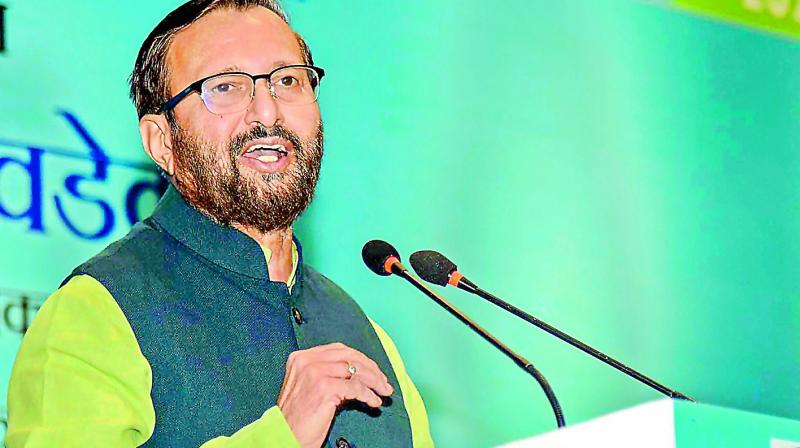Anti-Hindi stir: much ado about nothing?
Chakraborty argues, \"So these languages don\'t exactly have an \'official\' status as of now.

Chennai: Prakash Javadekar, then HRD Minister, had even in January this year clarified the Government "is very clear it is not going to impose any language on any part of the country". And not just that; the Supreme Court had as early as May 2017 thrown out a petition for making Hindi compulsory at school. Yet, many angry voices have erupted across the Dravidian socio-political platform slamming the 'saffron attempt' to thrust Hindi choking down the Tamil throat.
While refusing to entertain the petition from one Ashwini Kumar Upadhayay, the SC Bench headed by Chief Justice J S Khehar had said making Hindi-learning compulsory could open the flood gates for people of other languages to demand that theirs should also be made compulsory.
Constitutional experts have pointed out that the Constitution has said Hindi is the official language of the Union, which some argue meant only the Union Government and not the entire country. In the information site Quora, an expert Mithun Chakraborty pointed out sometime ago that Art 351 of the Constitution had said, "It shall be the duty of the Union to promote the spread of the Hindi language, to develop it so that it may serve as a medium of expression for all the elements of the composite culture of India and to secure its enrichment by assimilating without interfering with its genius, the forms, style and expressions used in Hindustani and in the other languages of India specified in the Eighth Schedule, and by drawing, wherever necessary or desirable, for its vocabulary, primarily on Sanskrit and secondarily on other languages."
Chakraborty argues, "So these languages don't exactly have an 'official' status as of now. They are to be used as bases to enrich Hindi. Also, the government has to "take measures for the development of these languages, such that "they grow rapidly in richness and become effective means of communicating modern knowledge." In addition, a candidate appearing in an examination conducted for public service at a higher level is entitled to use any of these languages as the medium in which he or she answers the paper."
Pointing out that English is the second Official language of India, Chakraborty explained, "It was made so as a transition from English (under British rule) can be smoothly done, and a period of 15 years was set aside, after which Hindi was to be the sole Official language. But due to protests in 1965 in TN, the transition was stalled and due to vote-bank politics, it has still not happened".
Perhaps the present HRD Ministry's panel in its draft report has sought to lay a roadmap for such 'transition' and drew flak from the Dravidian politicos-who incidentally are not known to have made any noise, or even a whimper, when they hear the airhostess make her announcements only in Hindi and English, even on a Chennai-Madurai flight.
It is pertinent to point out here that these Dravidian leaders have also been infamous for their double-talk on this language issue-opposing Hindi on political platforms and preaching its opposition to the gullible commoner while sending their own kids to Hindi classes to ensure better prospects when they grow up. Remember the famous Kalaignar quote (He knows Hindi) when some questions popped up, boldly, about his nominating first-time MP and grand-nephew Dayanidhi Maran to be in the Union Cabinet?
The inimitable Dr Subramanian Swamy threw in his own angle to fish in the troubled waters, tweeting quite aptly: "Is Congi going to defend DMK's stand that Hindi cannot be taught as a third language in Tamil Nadu? Or the party is going to slink away to avoid taking a stand?"
Needless to say Dr Swamy's poser drew a huge response from the twitterati. One of them, a Tamil living in the US, has posted: "Outside of TN, survival Hindi is good after English. Tamil is good only within TN. We need Hindi... I am in the US. I opted to learn Hindi in school, this helps me communicate with other Indians who do not know Tamil. Work is always English".
Another said he was a Tamil in Delhi and tweeted: "There are so many tamils in Delhi living for more than 2 generations. They speak Hindi well with non tamils and continue to speak Tamil at home/with other Tamils. I think it's propaganda that Tamil is threatened by Hindi in any way"
There was another who thrust his finger into the sticky political soup, saying: "Everybody in Tamil Nadu would welcome teac-hing Hindi in schools. Only few politicians will make some noise altho their kids are learning Hindi in pvt schools". There was one whose tweet must get the prize, if there is one. He named a particular DMK politician and said he spoke in Hindi asking for votes in the recent elections and "dmk kept mum. its just an eye wash when it comes to protest against hindi".
At the end of it all, there is truly warm nationalist spirit among these anti-Hindi kazhagam honchos. Ask friends in the Mint Street and so many other areas of Chennai where a significant population of Hindi-speaking families from the north have made their homes and businesses and they would say with a proud giggle: "Please come and see during our festivals such as Diwali and Holi; you will find many DMK leaders pasting Hindi posters on the walls conveying their good wishes to us. Nice people. We like them".

